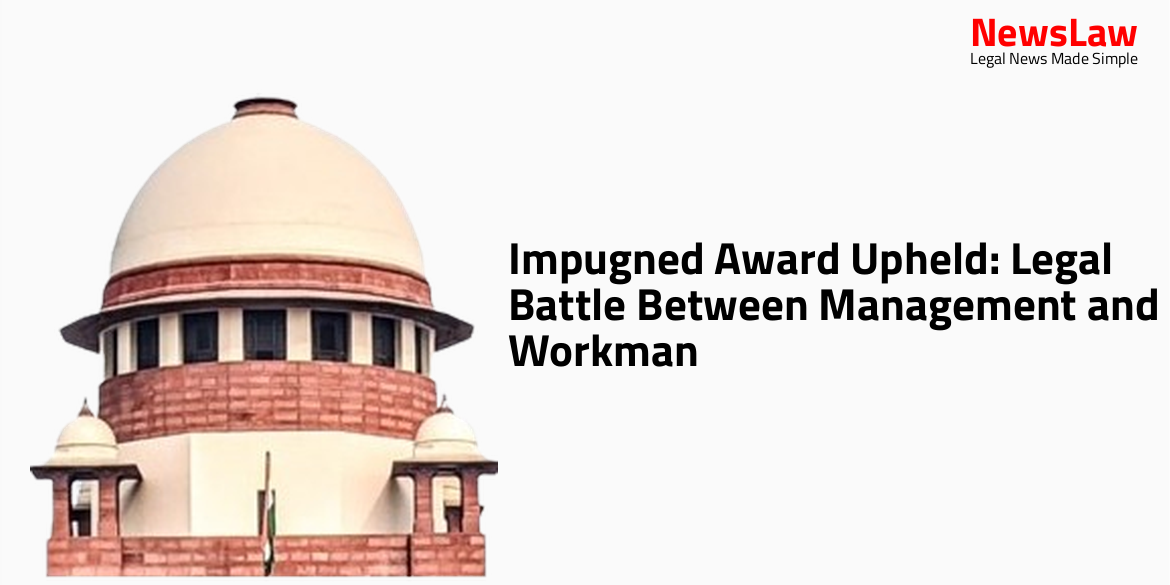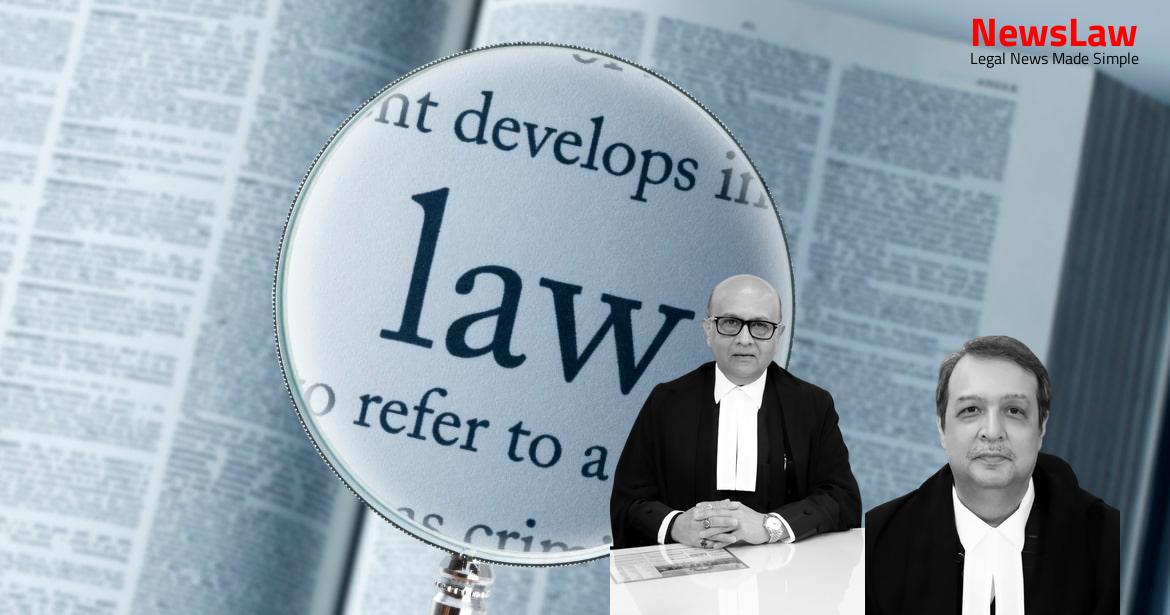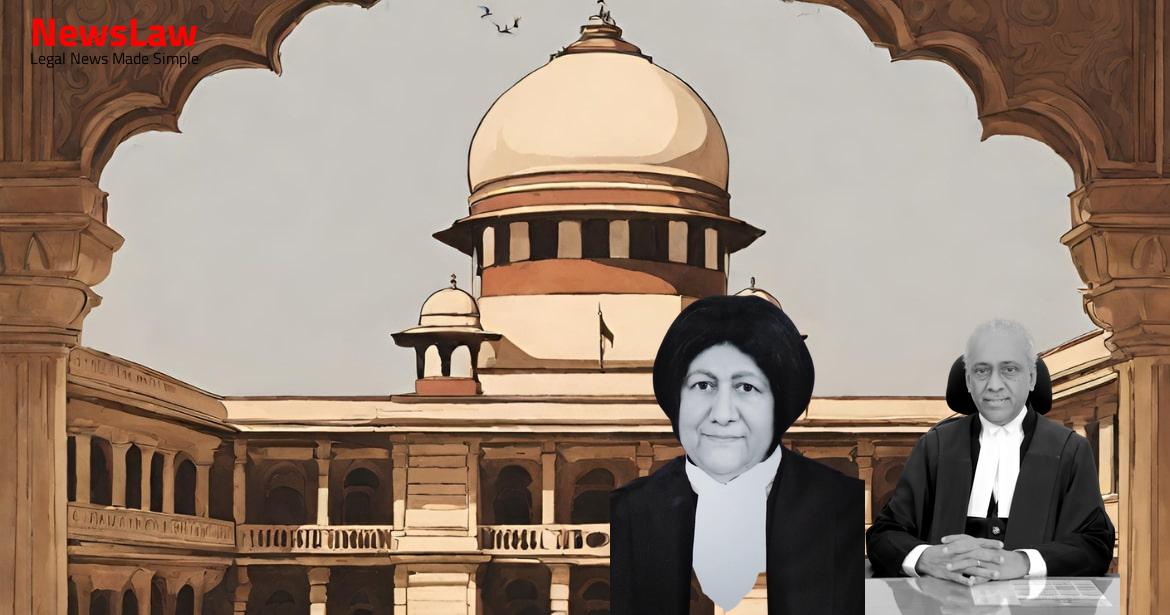In a recent judgment by the Delhi High Court, the impugned award has been upheld in the legal battle between the management and the workman. The court’s decision reaffirms the workman’s entitlement to fair compensation, setting a precedent for future labor disputes. The ruling emphasizes the importance of upholding compensation rights for employees in such cases.
Facts
- The Labour Court failed to appreciate that the workman had been receiving a salary prescribed for unskilled work and had never objected while in service.
- The Industrial Tribunal’s judgment in the designation case did not provide a skilled designation as per the scheduled employment for the workman in question.
- The workman’s salary was consistent with that of an unskilled worker.
- The stay order in unrelated cases improperly influenced the Labour Court’s decision.
- The urgency of seeking a stay in the case was questioned, as both parties showed no urgency in pursuing the matter.
- Retrenchment compensation is inadequate due to the impending closure of the management.
- The workman is entitled to wages of the skilled/semi-skilled category as per POIT’s designation on 29.09.2009.
- The Labour Court awarded the workman a lump-sum compensation of Rs.200,000/- to be paid within one month or 9% interest per annum applies.
- The Labour Court should have considered the wages of skilled and semi-skilled workers for fair compensation.
- The issue of back wages post the Labour Court’s award will be decided by the High Court.
- The management calculated retrenchment compensation based on the last drawn salary, not on the skilled/semi-skilled worker wages as ordered by POIT.
- The claimant did not work with the management from transfer to rejoining, thus this period should not be included in retrenchment compensation calculations.
- Sections 9A and 25-N of the Act were found to be inapplicable in this case.
Issue
- Issue No 2 questions if the stayed award of the Industrial Tribunal could be considered by the Labour Court in determining entitlement to compensation.
- The Workman in question was being paid as ‘unskilled’ labor from the time of appointment until retrenchment.
- The issue for the Court to decide is whether the Labour Court’s award should be reviewed under Article 226 of the Constitution of India.
Arguments
- The petitioner argues that the award dated 29 September, 2009, which was in operation at the time of the workman’s illegal retrenchment on 5 May, 2010, was stayed by the court in November 2013.
- The petitioner contends that the judgments cited by the Labour Court are not applicable as they do not align with the specific facts of this case.
- The petitioner claims that the workman was willing to work but was kept away without valid reasons.
- It is argued that the Labour Court should not have relied on the stayed award of 29 September, 2009 in passing the impugned award.
- The petitioner asserts that the impugned award should not have been passed as the stay order was still in effect at the time of the Labour Court’s decision.
- The petitioner highlights that the workman never objected to his designation or wages during his time of service.
- The petitioner raises concerns about the retrenchment compensation and disputes any malicious intent in the payment.
- It is argued that the Labour Court should have considered the workman’s long tenure (16 years) while computing compensation and benefits.
- The petitioner emphasizes that the impugned award lacks illegality and was passed in accordance with legal principles.
- The petitioner states that the workman’s union activities should not be a factor in the retrenchment decision.
- The petitioner disputes the designation given in the 2009 award and argues that it was based on insufficient evidence.
- The petitioner stresses the workman’s compliance with receiving unskilled wages throughout his employment.
- The Ld. ARM argued that designation has not been granted to the claimant due to the correct calculation of retrenchment compensation and notice pay based on last drawn wages, not the award dated 29.09.2009.
- The award from 29.09.2009, which was not challenged by the claimant before any forum, is now final and acts as res judicata.
- The claimant had previously filed a case against his transfer, with the POIT determining that he was engaged in unskilled work. This finding was highlighted during the argument.
Analysis
- The learned Labour Court rightly awarded compensation based on the designation of the workmen.
- The seniority list was displayed and sent to the Labour Department, indicating the length of service of the workers.
- All 22 workers had filed a designation case which was decided in their favor on 29.09.2009.
- The claimant failed to prove that he had not become surplus at the time of retrenchment.
- No evidence was provided to show that junior employees were retained by the management.
- The award in the transfer case did not hold that the workers were entitled to wages of skilled or semi-skilled category.
- The Court held that for the want of compensation due to the workman, the retrenchment violated Section 25F of the Act.
- The management failed to calculate notice pay and retrenchment compensation based on the 2009 award designations.
- The POIT found the transfer of one worker to be illegal.
- The management sent the seniority list to the Labor Commissioner.
- Evidence was lacking to support the claimant’s allegation of becoming surplus at the time of retrenchment.
- The Court upheld that the services of the workman were terminated in violation of Section 25F of the Act.
- The computation of compensation at the time of retrenchment was done based on the unskilled category instead of skilled/semi-skilled workers.
- The Court found no illegalities in the impugned award and made its decision based on the entirety of the facts and circumstances.
- Witnesses failed to provide evidence contrary to the seniority list prepared by the management.
- There was no violation of Section 9A of the I.D. Act, 1947 in the transfer of the claimant to other places.
- The learned Labor Court rightly awarded compensation to the workman based on the designation awarded in the 2009 decision.
- The management did not violate Sections 9A and 25-N of the Act as they were not applicable.
- The seniority list was displayed and sent to the Labor Commissioner as per regulations.
- Evidence was lacking to counter the testimony of the witness regarding the surplus workforce at the time of retrenchment.
- The Court discussed the effect of a stay on adjudication in the case of Shree Chamundi Mopeds Ltd. v. Church of South India Trust Assn.
- The principle of restitution requires parties to be restored to their pre-stay positions after dismissal of proceedings.
- The distinction between repeal and suspension of the law was clarified, stating that repeal removes the law entirely while suspension retains its existence with limited operation.
- The legal maxim ‘actus curiae neminem gravabit’ applies, ensuring that no prejudice is caused by the Court’s actions.
- Judicial decisions in various cases provided guidance on the effect of stays and dismissals on obligations, emphasizing the duty to restore parties to their original positions.
- Section 25-F of the Act establishes conditions for retrenchment of a workman.
- The employer must provide one month’s written notice or pay wages in lieu of notice.
- Compensation equivalent to fifteen days average pay per completed year of service must be paid at the time of retrenchment.
- Continuous service for at least one year with the employer is required for a valid claim for compensation under this Section.
- The requirement of continuous service for compensation was reiterated in L. Robert D’Souza v. Executive Engineer, S. Rly. by the Hon’ble Supreme Court.
- The learned Labour Court found that the petitioner management had illegally retrenched the workmen without proper compensation based on their designations.
- The petitioners failed to present any convincing arguments in their favor.
- The Court agrees with the Labour Court’s findings and does not see any merit in the petitions.
- The findings by the Labour Court were upheld as there was no illegality observed in the management’s actions.
Decision
- The petitioner management is directed to pay the compensation awarded by the Labour Court to the respective workmen within three months.
- The batch of petitions is dismissed.
- Management must pay Rs.2,00,000/- to the workman within one month from the publication date of the award.
- If the payment is delayed, 9% interest per annum will be applicable from the current date.
- Each party will bear their own costs.
- Award is passed accordingly.
- Copies of the award should be sent to the Delhi Government for publication.
- The file is to be archived in the record room.
- The issue of the legality of the workman’s retrenchment was upheld by the Labour Court.
- The impugned award is upheld by the Court.
- Pending applications are dismissed.
- The judgment will be uploaded on the website immediately.
Case Title: SAWHNEY RUBBER INDUSTRIES Vs. SH CHINTU KUMAR (2024:DHC:4569)
Case Number: W.P.(C)-6069/2020



